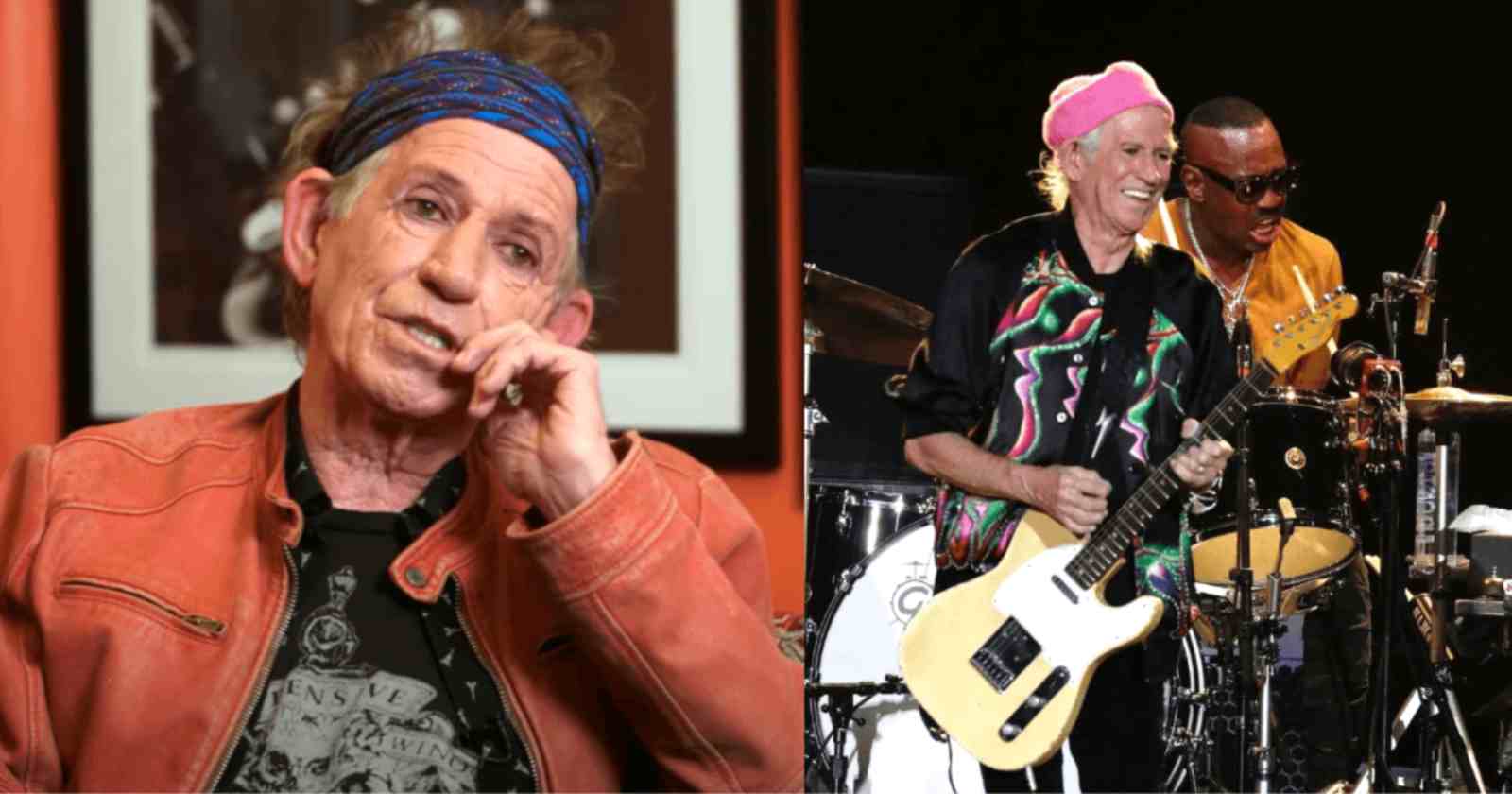ARTICLES
11 songs that Keith Richards listed as some of his favorites of all time
One of the most influential guitarists of all time, Keith Richards is a member of The Rolling Stones since their foundation in 1962 and during the last 6 decades he was able to hear many artists, especially Blues musicians that plays the genre he likes the most. In an interview with Planet Rock on the show Blues Power (Transcribed by Rock and Roll Garage), the legendary musician listed 11 Blues songs that are some of his favorites of all time and explained why they are so important to him.
11 songs that Keith Richards listed as some of his favorites of all time
Elvis Presley “Hound Dog”
Before listing this Elvis song, Keith Richards explained that his mother listened to a lot of Jazz and that was the kind of music that he first had contact with, later on discovering Country Blues and Rock and Roll music. “I sort of already felt familiar with it (Country Blues) and at the same time at that age I was starting to listen to early Rock and Roll”. Since he already had contact with Jazz and Country Blues, the musician said that when he heard Rock music sounded perfectly normal to him and he wasn’t shocked like many other people at the time were. “It doesn’t seemed like it was some new kind of music, it was sort of natural (For me). I was listening to a lot of Chuck Berry and Elvis, those early records and there is a lot of Blues in there,” Keith Richards said.
One of the most influential Rock and Roll artists of all time, Elvis Presley was the main inspiration for many artists like The Beatles, that decided to become Rock musicians after they heard his record, saw him performing and watched his movies. He is recognized as the best-selling solo artist of all time with more than 500 million records sold worldwide by Guinness World Records.
Sonny Boy Williamson II “Checkin’ Up On My Baby”
Keith Richard didn’t explained directly why he chose Sonny Boy Williamson track but before the track was played he talked about how he traced the artists influences to discover the origin of their sound. “Automatically for me I wanted to know ‘Okay where did he get it from?’ So I decided to check back from Chuck Berry and found out that ‘He was like a prodigy of Muddy Waters’. Then I got to check out Muddy Waters and (I thought) ‘Now, I get it!’ From there, (I went) Where did Muddy Waters got it from? A cat called Robert Johnson! So I’m kind of following the trail back all the time until you get to all the famous 20s and 30s Blues players, some incredible guitar players. Incredibly innovative songwriting. But at the same time all within this very quite strict musical confines,” Keith Richards said.
Born in Greenwood, Mississippi back in 1912, Sonny Boy Williamson was an important Blues harmonica player, singer and songwriter. Some of his most famous songs are ” Help Me”, “Bring It On Home” and “Don’t Start Me To Talkin'”.
Jimmy Reed “You Got Me Dizzy”
“He was totally unique amongst even all of the other 50s and 60s bluesmen out of Chicago. He is such a distinctive sound. It was almost as if he was laying out to you. Like ‘Look, it’s really not hard to do. You’ve just got to relax and get into it’. Such a simplicity of sound, so stark and at the same time such an underlying humor in it. Which is why I picked ‘You Got Me Dizzy’, because he just flings this thing around and is just so beautifully natural. There is no pretension about it. I love Jimmy Reed, a unique sound. There are thousands and thousands of Blues players out there and to find a unique sound and a way to play it is an extra touch of genius. Jimmy Reed had it,” Keith Richards said.
Born in Dunleith, Mississippi back in 1925, Jimmy Reed was one of the most influential Blues players that ever existed. Some of his most famous song are “Honest I Do” (1957), “Baby What You Want Me to Do” (1960) and “Big Boss Man” (1961).
Muddy Waters “Still A Fool”
When talking about Muddy Waters, Keith Richards recalled that Led Zeppelin guitarist Jimmy Page also went to see the Blues guitarist when he played in Manchester, before the two were famous. “Jimmy (Page) was there, I don’t think he traveled up with us, I’m not sure. But Muddy Waters was appearing in Manchester’s Free Trade Hall and we made the pilgrimage. It was the most amazing thing because Muddy comes on, the first set and he is doing what people at that time expected of Blues players.”
“He is wearing a pair of dungarees, he is playing acoustic guitar, then he comes back with a band and an electric guitar and they booed him (laughs). Not him they booed, it was the electric guitar. It was a thrilling performance and reinforced what I was like hoping for, from everything. I picked ‘Still a Fool’ because it is really gut bottom blues, there is no finesse about this one. It’s just straight in your face and it’s almost crude. That’s what I like about it, it’s crudeness” (laughs), Keith Richards said.
Among Muddy’s most famous songs are “Mannish Boy”, “I’m Your Hoochie Coochie Man”, “Rollin’ Stone” and “Got My Mojo Working”. He was inducted into the Rock and Roll Hall of Fame back in 1987 by Paul Butterfield.
Chuck Berry “Let It Rock”
“You don’t hear this one a lot but it has all the ingredients of Chuck Berry in it. The incredible guitar solos, very innovative drum beat going on behind it. What I learned from Chuck Berry was ‘pick your drummer’, is the most important man. If you’re doing stuff like Chuck Berry and I do, which is rhythm guitar, the drummer can ruin it if he ain’t on. Which is why I have Charlie Watts. To me is really like the epitome of what Rock and Roll should sound. It’s got edge on it, it’s got effortless, there is three guitar solos in there and they’re all beautiful.”
“He is almost off the scale, at that time everything just seemed to flow out of him. He is a complex guy once you’ve got to know him, he once gave me a black-eye backstage of a gig of his. Chuck was in his normal by that time mode of the little black bag, got the money and run. He left his guitar out in his dressing room and I just picked it up. He walks in and (says) ‘Nobody touches…’ (and punches Keith Richards). Few months later I get these apologetic ‘Keith, I didn’t know it…’ (And I say) ‘Chuck, you did the right move. I wouldn’t let anybody touch mine either (laughs),” Keith Richards said.
Back in the late 80s, Keith Richards tried to help Chuck Berry’s career more closely and even played live with the musician. He appeared in the 1987 documentary about the American musician called “Chuck Berry: Hail! Hail! Rock ‘n’ Roll”.
Little Walter “Key To The Highway”
“Little Water Jacobs, his voice, he is so smoky, that voice. I mean, I should probably say that he was probably the heart player of the Blues of all time. He was amazing. Apparently he learned his stuff of Louis Armstrong but he couldn’t afford trumpet. So he started to work on harmonica. He is also Muddy Waters’ heart player and all other great records. Then he started to get hits on his own. It’s always hard for me to pick one but this one just because it had basically all the elements I like about Little Water. It’s a classic song and Little Water kills it. Listen to the man,” Keith Richards said.
Born in Marksville, Louisiana, back in 1930, Little Walter was a singer and harmonica player that had strong impact on future generations of musicians. His work helped other musicians to see what could be done with the harmonica. He was inducted into the Rock and Roll Hall Of Fame back in 2008 and still is the only artist that was inducted specifically as a harmonica player.
Howlin’ Wolf “The Red Rooster”
“It’s so difficult to pick out one track from someone that’s been so prolific. He was the Blues. I mean, Howlin’ Wolf, there is some presence about the man. He was enormous, he was a big guy, on top of impressive. But at the same time and incredible heart player, a voice like a well-tuned falcon and such intensity when he is doing his gig. At the same time very sensitive, you always got this other slight thing.”
“I never met a tough guy that didn’t have the other side to him. I think that ‘Red Rooster’ is the other side of Howlin’ Wolf, though all these songs are written by Willie Dixon, who is also on bass in nearly all these songs, including Chuck Berry records. All of the records that came out of Chess (Records). Great Blues songwriter, an innovative, another great big guy.”
Howlin’ Wolf was a Chicago blues singer, guitarist, and harmonica player. Originally from Mississippi, he moved to Chicago in adulthood and became successful, forming a rivalry with fellow bluesman Muddy Waters. With a booming voice and imposing physical presence, he is one of the best-known Chicago blues artists.
His most famous songs are “Spoonful”, “Smokestack Lightin’”, “Killing Floor” and “How Many More Years”
John Lee Hooker “Boom Boom”
“John Lee was amazing, because he was the most archaic style of playing the Blues. Somehow he managed to reinvent it and I suppose to bring out the real essence of what the Blues are about. I tell you a story, the last time I saw John Lee, he lived in Oakland and he is having a barbecue. I think his nephew is cooking up but John Lee has five chicks living there. They are all learning Blues guitar and they are damn good too. What he did with these chicks when he wasn’t teaching them I had no idea but I’ve got to say the man was still up and ready at 75.”
“I admired John for that. A great funny guy, great sense of humor. In way to meet these guys that you listened to when you were a kid then judgely hang around and have a joke or two, just fling a lick around and say ‘hey, I heard that thing you did in there. Show me that lick!’ Anybody who wants to find out what Blues is about, John Lee Hooker you gotta listen to ‘Boom Boom’,” Keith Richards said.
Often considered by specialized magazines as one of the greatest guitarists in history, John Lee Hooker developed his own driving-rhythm boogie style. Some of his most famous songs besides “Boom, Boom” are “Boogie Chillen'” (1948), “Crawling King Snake” (1949) and and “One Bourbon, One Scotch, One Beer” (1966).
Otis Redding “These Arms Of Mine”
“Otis was out of Macon, Georgia, so was Little Richard, you see, who I knew really well. When Little Richard left Macon, Georgia because he became a star, Otis for quite a while was a Little Richard imitator, that is what he used to do. I mean, he had sort of filled in the slot when Little Richard left town, which amazed me at first and especially if you heard ‘These Arms Of Mine’. It seems a million miles away from Little Richard’s ‘Lucille’ or ‘Long Tall Sally’.”
“But Otis had a voice that crawled up on you, such expression in there and he found that thing in Memphis. You see, I wouldn’t have gone for ‘Pain In My Heart’, ‘That’s How Strong My Love Is’, but ‘These Arms of Mine’ because I don’t hear it a lot and I just thought everybody should get a chance to hear it. Otis Redding, once again like Jimmy Reed, a unique sound. Another large-hearted guy who went too soon. I always wondered what Otis would have done by now. But the good die young, where does that leave me (laughs),” Keith Richards said.
Otis Redding tragically died back in 1967 victim of a plane crash at the age of 26. Even with a short career, the musician influenced a whole generation of musicians from various music genres. Some of his most famous songs are “(Sittin’ On) the Dock of the Bay”, “Stand By Me” (cover) and “Try A Little Tenderness”.
Freddie King “Going Down”
“There is so many kings, there is Albert, there is B.B. of course and Freddie King I thought I’d go for him because ‘Going Down’ is a beautiful riff. It’s fairly original and he sings it so cool. Beautiful riff, great band on this one,” Keith Richards said.
One of the most influential Blues guitarists in history, Freddie King is recalled for his soulful and powerful vocals and unique guitar playing style. Some of his most famous song are “Going Down”, “I’m Tore Down” and “Stumble”.
Robert Johnson “Love In Vain”
“The real Blues. I mean, where all the other guys we’ve talked about come from without a doubt. One of the most innovative Blues songwriters of all time. Another one you say ‘Where he would have taken it (His music)’. I chose ‘Love In Vain’ first because like ‘Rooster’ (Howlin’ Wolf’s song) it has a connection with the Stones, but also has a beautiful sort of fragility about his voice and the guitar following it. It’s supereme, it’s superb. You can’t really analyze it anymore than say ‘wow, that’s the stuff’,” Keith Richards said.
Johnson performed in studio only twice in his career, the first one in 1936 in San Antonio and the second in Dallas back in 1937. In those sessions he recorded 29 distinct songs (with 13 surviving alternate takes) that changed the history of the Blues.
He died at the age of 27 back in 1938 of unknown causes in Mississippi, same state he was born. His death cause is widely disputed by music historians. Some claim that he was poisoned by a jealous husband and others say that he had congenital syphilis, what may have contributed to his death. But Johnson’s poorly officially documented life and death fueled the myths surrounding his persona.
I'm a Brazilian journalist who always loved Classic Rock and Heavy Metal music. That passion inspired me to create Rock and Roll Garage over 6 years ago. Music has always been a part of my life, helping me through tough times and being a support to celebrate the good ones. When I became a journalist, I knew I wanted to write about my passions. After graduating in journalism from the Pontifical Catholic University of Minas Gerais, I pursued a postgraduate degree in digital communication at the same institution. The studies and experience in the field helped me improve the website and always bring the best of classic rock to the world! MTB: 0021377/MG










